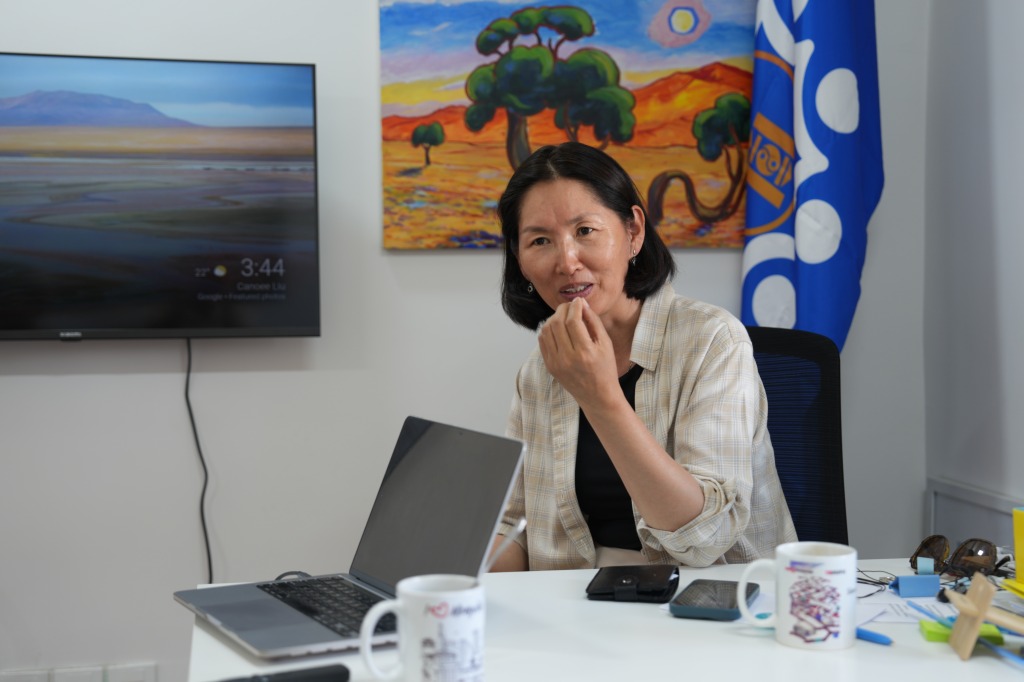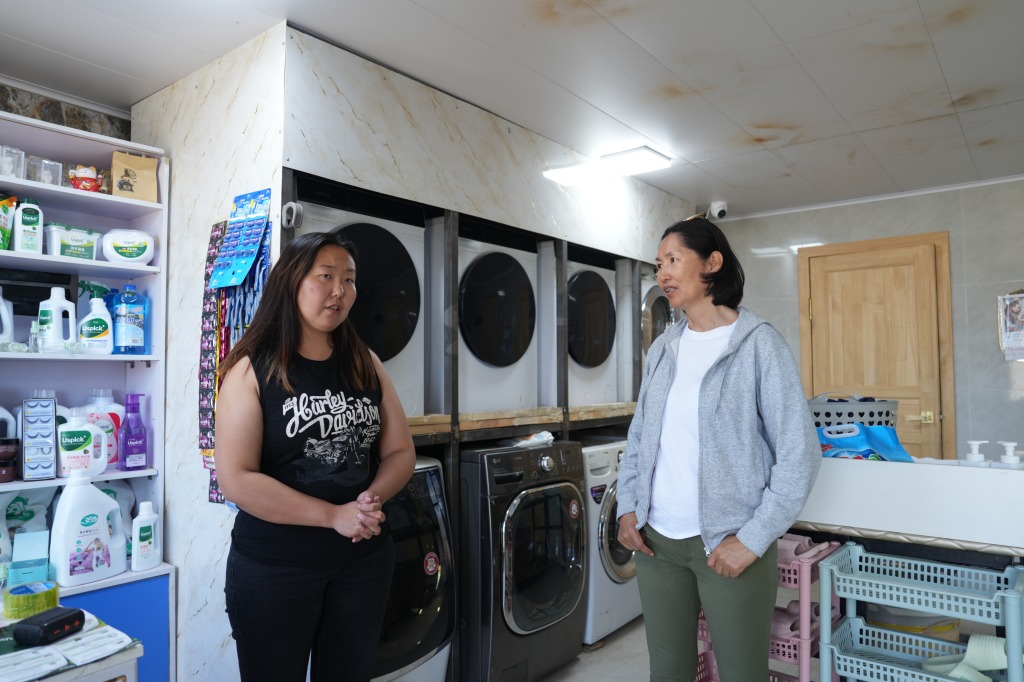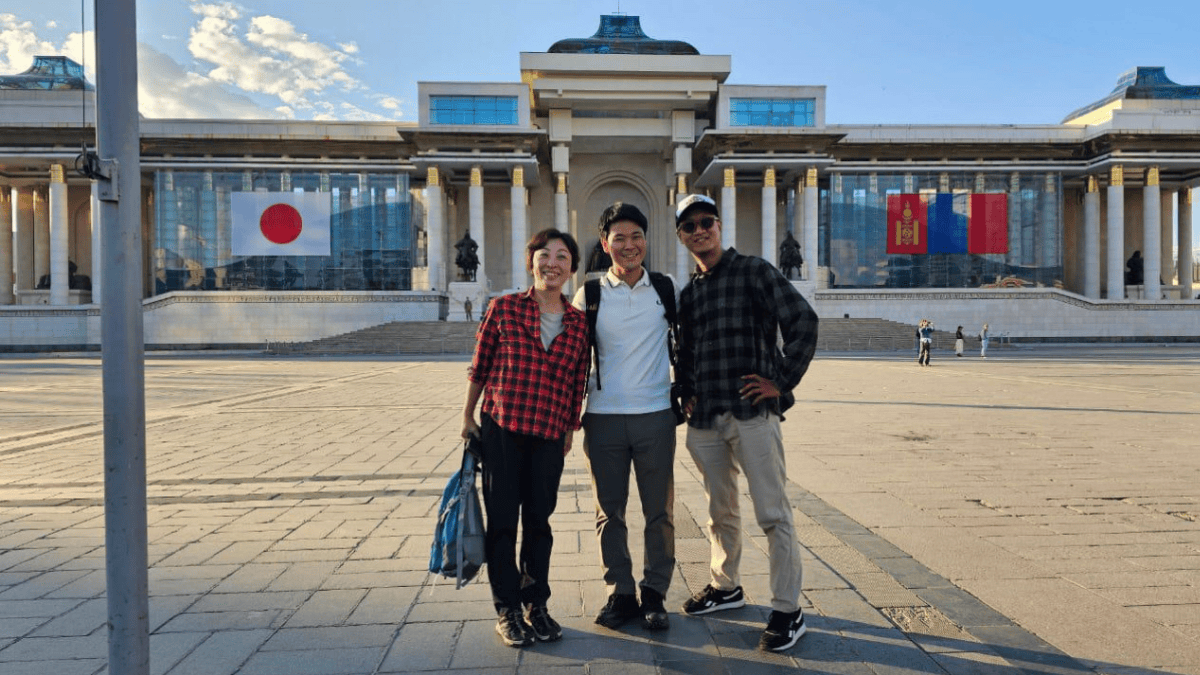
Inside Mongolia’s Toilet Revolution: Impact Hero 2023 Oyuna, Site Visit Report
We spent one unforgettable week in the field with Oyuna and her team, gaining firsthand insight into the magnitude of the problem—and the determination driving the solution.
Life in the Expanding Ger District
Just a 20–30 minute drive from the high-rises of central Ulaanbaatar, we were overwhelmed by the view from the surrounding hills: a vast expanse of the ger district. Home to 70–80% of the capital’s population, the area continues to expand. From paved roads, unpaved ones stretch outward in all directions, flanked by scattered houses and traditional dwellings called gers.
 View overlooking the ger district
View overlooking the ger district
What shocked us even more was that most homes in this area are not connected to water or sewage systems. In the harsh Mongolian winter, temperatures plummet below -30°C, freezing uninsulated pipes. Families need to collect water manually from over 1,100 public kiosks around the outskirts of the city. They filled large tanks and hauled them back home—a laborious task especially for children and women.
 Children carrying water from a public kiosk
Children carrying water from a public kiosk
In such water-scarce conditions, flush toilets are unrealistic. Hence people rely on pit latrines—deep holes dug into the ground, placed some distance from the home. Since pit latrine waste removal is costly, many residents abandon filled pits and dig new ones. Even in areas with sewer infrastructure, the affordability of connection remains a major barrier. This is a major cause of severe soil contamination and health hazards.
 A pit latrine
A pit latrine
However, a major hurdle to tackle the toilet issue is the cultural taboo surrounding it. In Mongolian society, excrement is seen as filthy and must be separated from daily life—physically and mentally. Add it with modern ideas that associate flush toilets with wealth, and the result is a deeply entrenched taboo that prevents open conversation about sanitation.
Oyuna Challenges the “Toilet Taboo”
Recognizing the seriousness of the issue, Oyuna researched toilets around the world to seek a solution suitable for Mongolian life. Her search led her to dry toilets, which require no water and are easy to maintain—perfect for the ger district.
Since 2017, Oyuna has traveled across the country and spoken with over 7,500 people, breaking the toilet taboo and encouraging them to take action. We clearly witnessed the impact of this shift during our visit.
We visited the home of a couple in their 70s who were the first to install a dry toilet thanks to Oyuna’s guidance. Their grandchildren used to avoid visiting, afraid of the “scary, dirty” pit latrine. Motivated to fix the problem, the couple learned about Oyuna’s recommended dry toilets. They buried their old pit latrine and installed a dry toilet in a corner of their storage shed. Now, their grandchildren happily visit, and they proudly welcome guests without hesitation. They also showed us their beautifully green garden—which is rare in the district—and told us that they fertilized it with compost made from excrement.

 The first family who received Oyuna's dry-toilet
The first family who received Oyuna's dry-toilet
When “Improved Toilets” aren’t So Improved
We had heard that international agencies and the Mongolian government had tackled the country’s toilet crisis for years but hadn’t found a breakthrough. We saw that reality firsthand.
Across the ger district, we saw many “improved toilets” introduced with government subsidies. With metal walls, roofs, and exhaust pipes, they look modern from the outside. But the design still relies on digging pits in the ground. Worse, they cost nearly three times more than dry toilets. One resident sighed, “I bought one before learning about dry toilets. I wish I had waited.”
 "Improved” pit latrines by the government
"Improved” pit latrines by the government
Oyuna’s Effort to Create a New Market
Though Oyuna has raised awareness and shifted behavior through outreach, she knows that replacing all 600,000+ pit latrines in Mongolia cannot be done by one person or NGO alone. So she and her business partner, Daagii, started creating a new toilet market.
Oyuna and Daagii are building a network of local entrepreneurs who sell and install dry toilets in their communities. We have also seen laundries and water container sellers in ger districts sell dry toilets. For vendors, it’s a new income stream; for Oyuna’s team, it speeds up toilet adoption. Five such entrepreneurs are already active, and inquiries are increasing. It’s a community-powered model that’s working.
 A female vendor running both a laundry and a dry toilet outlet
A female vendor running both a laundry and a dry toilet outlet
Green Loans Supporting Dry-Toilet Expansion
We were especially inspired to learn that low-interest “green loans” are now helping promote dry-toilet purchases. Oyuna’s team partnered with two major banks so that this low-interest loan, which supports environmentally conscious activities, can also be used to purchase dry toilets. Daagiii also developed a new online system that enables people to apply and get approved within a single day—directly from their phones. During our stay, we even witnessed the platform’s very first successful loan application.
To think the idea we heard in February’s strategy meeting in Bali was now reality is proof of how astonishing Oyuna and Daagii’s determination are. We’re more convinced than ever that these two will truly transform sanitation in Mongolia.
 Daagi (right) is Oyuna's business partner
Daagi (right) is Oyuna's business partner
Mongolia’s First Toilet Education Center
Oyuna's next goal is to establish a "Toilet Education Center" that will serve as a training facility, knowledge hub, and showroom, supporting both outreach and entrepreneur training. The goal is to educate 3,500 people a year—one-third of them children—on safe and sustainable sanitation. After a week on the ground, we’re convinced that this center, planned for a site in the ger district, will be a vital catalyst for Mongolia’s Toilet Revolution.
 Concept image of the Toilet Education Center
Concept image of the Toilet Education Center
About Oyuna, Impact Hero 2023
During our stay, we spent nearly every waking moment with Oyuna and Daagii—in cars, over meals, and more. Though she is a former Minister, bestselling author, and influencer, we saw her blend naturally into both ger districts and nomadic communities. Despite being recognized on the street, she remained humble and soft-spoken. What moved us most was her hands-on leadership: she shows up, gets her hands dirty, and leads by example.
Daagii, her business partner, is the operational backbone. Though they once clashed to the point of almost parting ways, Oyuna eventually acknowledged her limitations and realized the value of Daagii’s expertise and commitment. That mutual trust now powers the Toilet Revolution.
We are deeply inspired by Oyuna’s charisma and humility, and the irreplaceable partnership she shares with Daagii.
 Daagii and Oyuna with their book on dry-toilets and waste management
Daagii and Oyuna with their book on dry-toilets and waste management
Final Reflection
Mongolia left us with unforgettable impressions—its vast landscapes, deep history and traditions, and above all, its warm and generous people. In every home we visited, we were welcomed with open arms. Though not materially wealthy, the Mongolians we met faced their challenges head-on and worked tirelessly on what they could do. Their strength and resilience filled us with hope.
One elderly woman who served us a mountain of food said something that stayed with us: “Oyuna’s work is essential for Mongolia. And you, as her supporters, are now family too.”
That’s the power of Earth Company’s Impact Heroes. They remind us that real change comes not only from vision and strategy, but from deep, personal human connection. That sense of connection is what gives us awareness and strength—and this week in Mongolia made us feel that more deeply than ever before.

Visiting team (from left to right); Mami Sato (Japan Representative/Impact Heroes Program Director), So Shimada (Impact Heroes Program Manager), Cornelius Permana (Social Media & Content Creator)
📸 Follow us on Instagram for future real-time updates from the field.